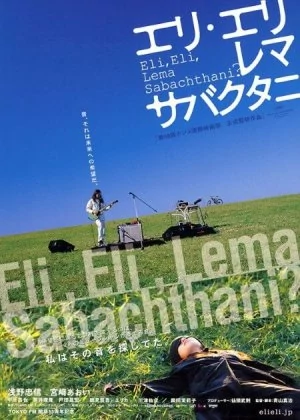Eli, Eli, Lema Sabachthani?
Movie details

Shinji Aoyama may be one of the pivotal directors of early 21st century Japanese cinema, few people are thoroughly familiar with his oeuvre. While I've seen most of his films, only one of them is a personal favorite. The odd one out (and you can take that quite literally) is Eli, Eli, Lema Sabachthani? [Eri Eri Rema Sabakutani], a strange and unconventional mix of sci-fi, musical performance and drama that is sure to challenge even the most hardened arthouse fans. I wasn't quite sure how it would hold up when I sat down for a rewatch, it's exactly that atypical approach that made sure the film has lost little of its original shine.
![screen capture of Eli, Eli, Lema Sabachthani? [Eri Eri Rema Sabakutani]](/thumbs/img/articles/1200xauto/eli-eli-1.webp)
Aoyama's oeuvre and style are hard to capture in a single sentence. There's more than enough quality in his work, and he has a minor penchant for crime films, even then he doesn't really stand for a single type of cinema, nor does he have a very recognizable signature style. That has no doubt held back his popularity overseas, as you couldn't really sell his work solely based on his reputation. But even outside the context of Aoyama's oeuvre, Eli, Eli, Lema Sabachthani is a rather nondescript film, an utterly weird mix of influences that make no sense on paper, but combine into a truly intriguing film.
What you're getting here is a post-apocalyptic setting, but without the usual dread or urgency of someone having to risk his life getting from A to B. Instead, this is a world which has suffered the consequences of a deadly disease, with the remaining people carrying on their life as well as possible. As if that wasn't genre-inappropriate enough, it appears the only cure for the disease comes from a duo of experimental noize artists, whose music seems able to ward off the effects of the virus. Think you're all set for a madcap adventure? Well, you're wrong, since Aoyama takes the stilted arthouse route here.
A mysterious virus is plaguing humankind. People infected with the virus can't help but commit suicide, which gives it its nickname: the Lemming Syndrome. A girl has been diagnosed with the disease, but she hasn't killed herself yet. Her grandfather, desperate to save her, is taking his granddaughter to find a famed musical duo whose music is said to nullify the spread. When they finally catch up with the musicians, they don't appear to be very eager to help out. The girl's grandfather isn't willing to give up so easily, and he keeps pestering them until they oblige.
![screen capture of Eli, Eli, Lema Sabachthani? [Eri Eri Rema Sabakutani]](/thumbs/img/articles/1200xauto/eli-eli-2.webp)
Visually, the film is rather low-key, apart from the finale. Aoyama doesn't spend too much effort on creating a post-apocalyptic wasteland, instead we get deserted landscapes, a couple of face masks and that's about the gist of it. The camera work is delicate though and the color grading adds to the desolate mood. Aoyama does crank things up during the finale, with some trippier visuals and snappier editing. Still, it's quite a way removed from Sogo Ishii's punk cinema (just to set the expectations straight). Other than that, the visual pacing is quite slow and deliberate, giving the film a more arthouse-like feel.
For those of you who don't quite like distortion and noize, rest assured that this music remains contained to very specific scenes. The rest of the soundtrack is quite jazzy, which gives an extra dimension to the already odd-looking future. That said, there are two or three extended scenes where it's all about distorted rumbles and tweeting guitars. These can be very unpleasant for people not used to this kind of music, then again you could say that about virtually every type of music. Personally, I love me a bit of noize from time to time, so it's nice to see directors take a chance on that.
As obscure as any of this may sound, Aoyama was able to land a pretty impressive cast. Someone like Tadanobu Asano was made for a film like this, so the fact that he's on board may not be all that surprising. Getting the rather timid Aoi Miyazaki to appear opposite of Asano is quite something else. Of course, she may have felt a little obligated after Aoyama's Eureka helped kick-start her career. Both put in great efforts, with an impressive Yasutaka Tsutsui helping them out in a memorable supportive role. It's really quite special seeing established actors doing a niche film like this.
![screen capture of Eli, Eli, Lema Sabachthani? [Eri Eri Rema Sabakutani]](/thumbs/img/articles/1200xauto/eli-eli-3.webp)
The start is a quite slow and Aoyama struggles just a little to properly introduce the setting and premise. Once the plot is well underway and the film is able to focus more on the characters and the atmosphere, things start to really pick up. It all works up to a pretty spectacular concert scene that forms the emotional core of the film. Eli, Eli, Lema Sabachthani may take a tad long to wrap things up after that, but by then I was so enamored with it that it didn't really bother me, and I was happy to be allowed to spend some extra times in its unique universe.
Eli, Eli, Lema Sabachthani is a film for the slightly more adventurous film fan who doesn't mind a highbrow aesthetic and can handle some arthouse vibes, but also doesn't shun a bit of experimentation and genre influence. It's not Aoyama's usual playground, but he fares remarkable well with this material. The cinematography is moody, the soundtrack is killer, the performances are on point and even though the film has some minor pacing issues, it presents a universe that would be intriguing enough to revisit at some point. A hidden gem, but only for a select audience.